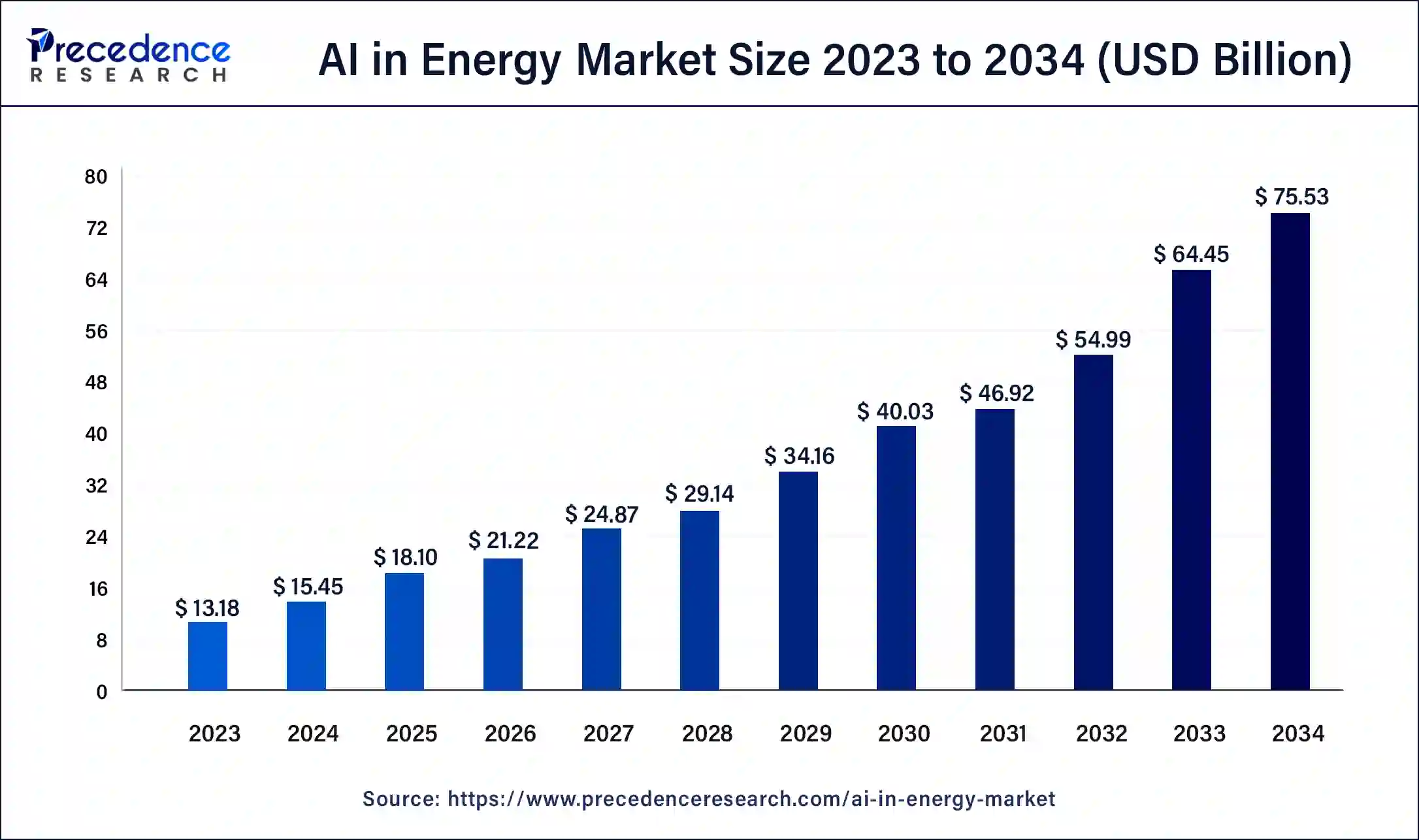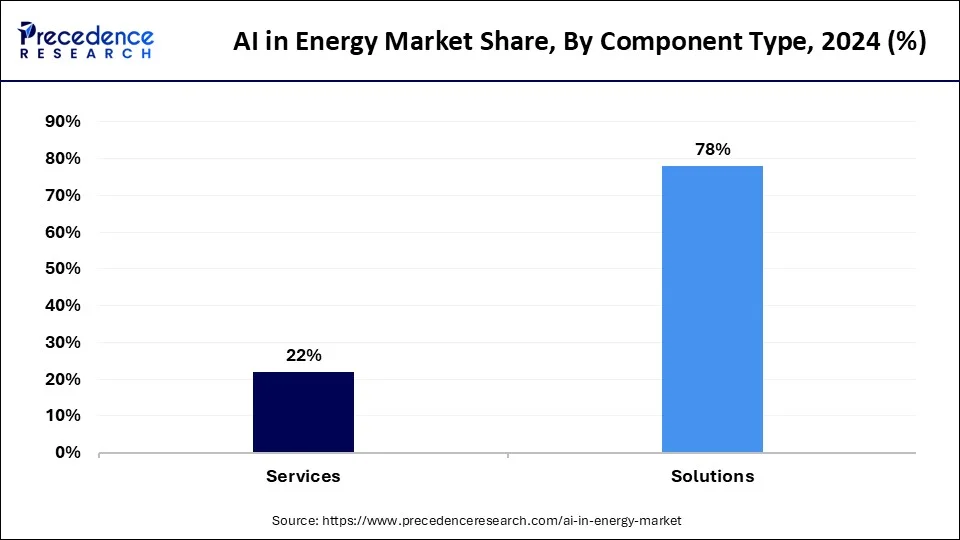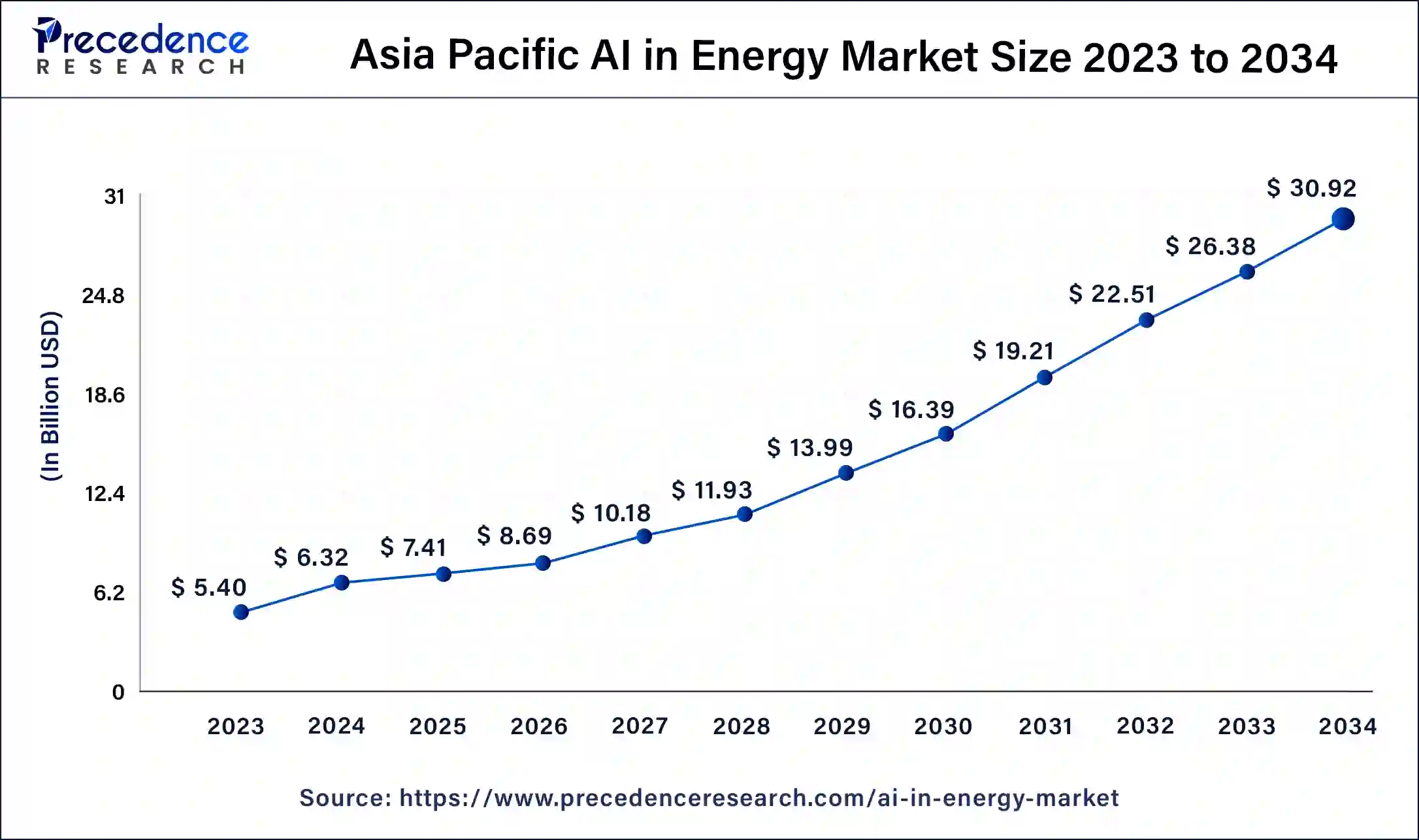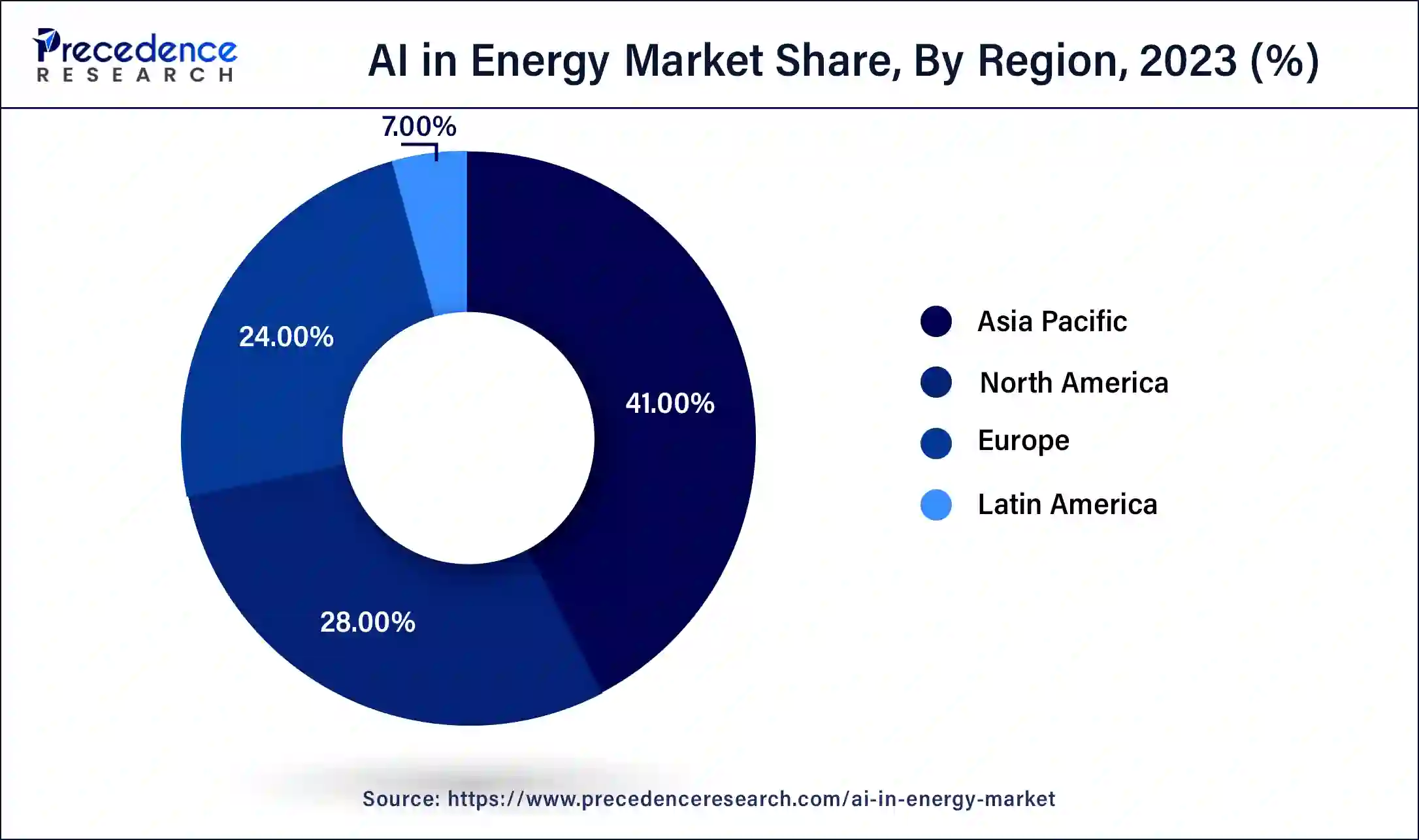What is the AI in Energy Market Size?
The global AI in energy market size is accounted at USD 18.10 billion in 2025 and predicted to increase from USD 21.22 billion in 2026 to approximately USD 75.53 billion by 2034, growing at a solid CAGR of 17.20% over the forecast period 2025 to 2034. The rising adoption of AI by energy companies, utilities, and grid operators is the key factor driving the AI in energy market growth over the forecast period.

AI in Energy Market Key Takeaways
- Asia Pacific dominated the AI in energy market in 2024.
- North America is expected to show the fastest growth in the market over the projected period.
- By component type, the solutions segment dominated the market in 2024.
- By component type, the service segment is expected to grow at a lucrative rate in the market over the forecast period.
- By deployment type, the cloud segment led the market in 2024.
- By deployment type, the on-premise segment is expected to witness significant growth in the market during the projected period.
- By application, in 2023, the safety & security segment dominated the market.
- By application, the demand forecasting segment is expected to grow rapidly in the market during the studied period.
- By end-user, the utility segment held the largest share of the market in 2024.
What are the Significances of AI in Energy?
Artificial intelligence (AI) is playing a crucial role in the energy sector by changing the way energy is created, distributed, and consumed. The utilization of AI technologies in the energy sector is called AI in energy. This has the potential to improve sustainability and efficiency gains, enhancing decision-making processes that can create significant changes in the AI in energy market, which can be seen in their uses like energy distribution systems and smart automated grids.
Global AI Adoption by Region
| Country | AI Deployment Rate | AI Exploration Rate |
| China | 50% | 36% |
| India | 59% | 27% |
| Canada | 37% | 48% |
| Italy | 36% | 38% |
| Singapore | 53% | 41% |
| United ArabEmirates | 58% | 32% |
AI in Energy Market Growth Factors
- Advancements in energy storage and management are expected to drive the AI in energy market growth soon.
- Rising applications of AI in safety and security and infrastructure can propel market growth.
- Many organizations are increasingly utilizing AI to optimize different operations, which is likely to further contribute to market expansion.
- AI can improve grid reliability and accelerate the transition to a sustainable energy future that can fuel market growth further.
- Rapid modernization of energy in developing nations can boost the AI in energy market growth shortly.
Trends Influencing the Future of AI in Energy Market
- AI-Powered grid optimization- AI plays a crucial role in modernizing power grids through real-time data monitoring, demand forecasting, and predictive maintenance. The intelligent algorithms also optimize load balancing and energy distribution, which is especially important given the rise of decentralized sources and renewable energy.
- Predictive maintenance for energy infrastructure- Utilities are making increasing use of artificial intelligence for predicting failures in assets, such as turbines, transformers, and pipelines. By collecting and processing data from sensors and operational parameters, AI has the effects of minimizing the downtime of the asset, extending the life of the asset, and minimizing costs by proactively managing maintenance activity.
- Energy trading and market forecasting- AI has changed the landscape for energy trading, providing various forecasting models that predict demand in the market, pricing trends, and the expected output from renewable generation. This is particularly useful in determining outcomes in volatile markets with increasing levels of renewable energy in the market.
- AI-Powered energy efficiency in buildings and industry- Smart systems enable AI to monitor and control HVAC equipment, along with lighting and equipment usage, while minimizing unnecessary energy waste.
- AI in renewable energy integration and storage management- AI can assist in managing the temporal variability of solar and wind power generation patterns, and also optimizing the use of energy storage systems.
AI in Energy Market Outlook:
- Global Expansion: This is mainly led by the rising need for smart grid management and renewable energy integration.
- Major Investor: Google partnered with Entergy Arkansas for $4B AI and Cloud investment, to supply power.
- Startup Ecosystem: Atomic Canyon secured $7M Series A Funding to facilitate an AI-enabled solution to search nuclear documentation and optimize workflows.
Market Scope
| Report Coverage | Details |
| Market Size by 2034 | USD 75.53 Billion |
| Market Size in 2025 | USD 18.10 Billion |
| Market Size in 2026 | USD 21.22 Billion |
| Market Growth Rate from 2025 to 2034 | CAGR of 17.20% |
| Largest Market | Asia Pacific |
| Base Year | 2024 |
| Forecast Period | 2025 to 2034 |
| Segments Covered | Component, Application, End-user, Deplyoment, and Regions |
| Regions Covered | North America, Europe, Asia-Pacific, Latin America and Middle East & Africa |
Market Dynamics
Driver
Rising demand for renewable energy integration
The growing worldwide emphasis on sustainability, as well as the decrease in carbon emissions, is a significant factor driving the AI in energy market. Renewable energy sources like solar and wind are becoming increasingly important in the energy mix. Moreover, AI's ability to forecast energy supply from renewables using historical data and weather conditions enables more effective management of supply and demand. This capability of AI also enhances grid stability and the generation of renewable energy.
- In July 2024, Spanish Prime Minister Pedro Sanchez announced a new plan worth 2.3 billion euros to boost the country's transition to clean energy, including subsidies for green energy industries and hydrogen made from renewable power.
Restraint
Technological complexities
The complexity of integrating AI systems into current energy infrastructure coupled with the high initial investment needed for implementing AI technologies can hamper the AI in energy market growth significantly. Moreover, the complexity of retrofitting legacy systems with AI abilities creates technical anomalies that can constrain the adoption rate of the market.
Opportunity
Developments in IoT and big data analytics
The ongoing developments in big data analytics and IoT (Internet of Things) create lucrative opportunities for the AI in energy market. The expansion of smart sensor technology generates extensive datasets that, after analyzing with AI, can uncover key insights to fuel efficiency. Furthermore, the combination of technologies enables more dynamic and nuanced control of energy systems, opening new doors for innovation in operational efficiency and energy management.
- In December 2023, Schneider Electric and Cisco collaborated to drive AI and IOT innovation in EMEA. Strategic collaboration to lead digital transformation via artificial intelligence (AI) and the Internet of Things (IoT). The MoU targets four primary areas: energy infrastructure, smart buildings, data centers, and industry solutions.
Component Type Insights
The solutions segment dominated the AI in energy market in 2024. The dominance of the segment can be attributed to the increasing need for integrated solutions that use artificial intelligence to improve energy efficiency and optimize power generation. Additionally, solutions in the AI energy field cover machine learning models, advanced analytics, and IoT integration, which stimulate predictive maintenance and renewables management.

The service segment is expected to grow at a lucrative rate in the AI in energy market over the forecast period. This is because AI services support the integration of AI solutions into core processes and business functions. Furthermore, AI can help companies to get more out of their marketing expenditure. Utilizing data services can also address operational efficiencies and energy security.
Deployment Insights
The cloud segment led the AI in energy market in 2024. The growth of the segment can be linked to the increasing flexibility, scalability, and cheapness of cloud services, which are important attributes for energy companies that are navigating the difficulties ofdigital transformation. Also, the cloud deployment model provides energy firms the agility to install AI solutions rapidly across numerous operations without the requirement for substantial upfront investment in IT infrastructure.
- In August 2024, Vultr, the world's largest privately held cloud computing platform, announced the launch of its industry cloud solution, which delivers industry-vertical, cutting-edge cloud computing solutions that meet specific industry needs and regulatory requirements across the retail, manufacturing, healthcare, media, telecommunications, and finance sectors.
The on-premise segment is expected to witness significant growth in the AI in energy market during the projected period. The on-premise segment in the AI energy market offers unparalleled customization and one-size-fits-all cloud services solutions. However, AI on-premises provides scalability to fulfill future energy demands and regulatory requirements efficiently.
Application Insights
The safety & security segment dominated the AI in energy market. This dominance is driven by increasing emphasis on protecting the confidentiality and integrity of data utilized in AI models and systems by market players. Furthermore, AI systems can break down complex data into easily framed insights which can help organisations to make critical decisions for the benefit of the company.
The demand forecasting segment is expected to grow rapidly in the AI in energy market during the studied period. The growth of the segment can be credited to the rising need for accurate and efficient energy management tactics within the evolving energy sector. Additionally, there is a growing global shift towards renewable energy methods amidst changing supply and demand.
- In February 2022, Windward, a predictive intelligence company, is partnering with Avni International, an independent tanker operator active in crude oil and petroleum shipment, to use AI in global maritime trade. To optimize its tank operations, the Windwards AI-powered platform will strengthen the company's sanctions compliance programmer, screen vessels, and assess maritime traffic and port congestion.
End-user Insights
The utility segment held the largest share of the AI in energy market in 2024. This is due to utilities playing an important role in combining AI technologies to enhance reliability, efficiency, and sustainability in energy systems. Moreover, the Utilities segment dominates the market because of the rising pressures of climate change coupled with the increasing need for renewable energy sources. AI helps utilities overcome these challenges by optimizing energy flow and offering data-driven insights.
- In September 2024, SmartMeasures, a leading provider of AI-powered customer engagement solutions, announced the launch of its pioneering Debt Reduction solution in the U.S. energy market for retailers and utilities. This groundbreaking technology harnesses the power of artificial intelligence (AI) and behavioral science to predict customer debt risk and proactively engage customers before their debt escalates.
Regional Insights
Asia Pacific AI in Energy Market Size and Growth 2025 to 2034
The Asia Pacific AI in energy market size is exhibited at USD 7.41 billion in 2025 and is projected to be worth around USD 30.92 billion by 2034, poised to grow at a CAGR of 17.21% from 2025 to 2034.

How did the Asia Pacific Dominate the Market in 2024?
Asia Pacific dominated the AI in energy market in 2024. This is due to nations like China, India, Japan, and South Korea are likely to offer lucrative opportunities for AI vendors in the region. Moreover, initiatives aimed at reducing carbon footprints and improving energy efficiency have received significant support which can drive market growth in the region further.
Possession of Digital Infrastructure Impacts North America
North America is expected to show the fastest growth in the market over the projected period. The dominance of the region can be attributed to the increasing adoption of advanced technologies coupled with the robust digital infrastructure in the region. North America, especially the United States, held the leading position in the market. Furthermore, the region's commitment to overcoming climate change and converting to more sustainable energy sources has fueled the adoption of AI technologies.

- In September 2024, SLB, an American oilfield services company, introduced its Lumi data and AI platform, a cutting-edge solution designed to integrate advanced AI capabilities across the energy sector. Unveiled at the SLB Digital Forum in Monaco, the Lumi platform is aimed at revolutionizing data management and improving decision-making skills.
Innovative Pilot Projects: Indian Market Trends
Day by day, India has been greatly relying on AI algorithms for significant developments in various areas, like energy. For this, India has been leveraging many pilot projects in different states, such as Gujarat and Karnataka are widely utilising AI to forecast solar and wind energy. Along with this, the UDAY scheme is also using AI-enabled tools for monitoring and improving distribution companies, and the deployment of smart meters to capture data for better energy management and policy design.
Executing Tech Giants' Energy Investments: U.S. Market Trends
To empower the AI in energy market in the U.S., it has been actively fostering heavy investments in clean energy projects. Such as Microsoft contracted for hundreds of megawatts from solar installations in Illinois, Texas, Michigan, and Missouri, & Google invested in a $20 billion partnership with Intersect Power to progress co-located energy parks.
Ongoing Advanced Grid Management & Forecasting are Driving Europe
Specifically, Europe is influenced by the coverage of smart grid management, while E.ON applies AI for the prediction of cable failures, a measure that has cut outages by 30%, as well as Italy's Enel has lowered power line outages by 15% using AI to track sensor data. Moreover, Europe is shifting towards renewable energy forecasting projects; for this UK National Grid ESO is aligning with AI startups on solar projects.
Implementing Government Initiatives: German Market Trends:
The German market expansion has been propelled by the contribution of the Federal Ministry for Economic Affairs and Climate Action (BMWK), which is offering funding to 21 research projects in its "GreenTech Innovation Competition" with around €75 million. However, a number of these projects emphasizes digital technologies and AI, such as the transformation of AI-based control tools for optimal system integration of renewable energies.
Key Players Offerings:
- Schneider Electric- It prominently offers various AI-enabled energy management for homes and buildings, predictive asset maintenance, and specialized infrastructure for AI data centers.
- Siemens AG- A significant company explores solutions focused on enhancing energy consumption, optimizing grid management, and driving the energy transition across numerous industries.
- Hazama Ando Corporation- This emphasises integration of AI into its construction operations, especially for safety monitoring and data analysis on energy infrastructure projects.
- General Electric- A vital player executes many software solutions that foster AI and machine learning (ML).
- AppOrchid Inc.- A company introduced Asset Seer and Easy Answers, which aim at predictive maintenance, customer engagement, and operational efficiency.
AI in Energy Market Companies
- Schneider Electric
- Siemens AG
- Hazama Ando Corporation
- General Electric
- AppOrchid Inc
- Alpiq AG
- ABB Group
- ATOS SE
- Zen Robotics Ltd
- SmartCloud Inc.
Recent Developments
- In May 2025, Enphase Energy, Inc. announced the launch of its new IQ Energy Management system in France. The solution integrates with Enphase solar and battery setups to enable smart energy management of dynamic electricity rates and selected third-party devices, including electric vehicle (EV) chargers, heat pumps, and resistive electric water heaters. (Source: https://solarquarter.com)
- In March 2025, EPRI, NVIDIA, and collaborators launched an open power AI consortium to transform the future of energy. The consortium includes energy companies, technology companies, and researchers developing AI applications to tackle domain-specific challenges, such as adapting to an increased deployment of distributed energy resources and significant load growth on electric grids. (Source: https://blogs.nvidia.com)
- In January 2025, SolarEdge launched an AI-based energy management system by connecting to a household's internet router via the local area network (LAN). It can communicate with inverters, electric vehicle chargers, heat pumps, and SolarEdge's servers. (Source: https://www.pv-magazine.com)
- In February 2023, ABB Group Announced a strategic partnership with Microsoft. to focus on AI-powered industrial automation solutions, which have applications in the energy sector.
- In February 2023, General Electric mentioned GE's continued focus on AI for predictive maintenance in the energy sector in industry publications.
- In January 2023, AVEVA, a global leader in industrial software, announced the completion of its acquisition by Schneider Electric. This move signifies Schneider Electric's continued expansion and investment in digital transformation solutions, particularly those enhancing AI capabilities within the energy sector.
- In June 2022, AIQ, a joint venture of Adnoc and Group 42, and Abu Dhabi's Hub71 are collaborating to research new artificial intelligence solutions for the Fuel industry. Hub71 and AIQ will collaborate as part of the agreement to advance the development of advanced digital technologies to maximize the value of Fuel operations and contribute to the energy sector's sustainability.
Segments Covered in the Report
By Component Type
- Solutions
- Services
By Application
- Robotics
- Renewables Management
- Demand Forecasting
- Safety and Security
- Infrastructure
- Others
By End-user
- Energy Transmission
- Energy Generation
- Energy Distribution
- Utilities
By Deployment
- On-premises
- Cloud
By Geography
- North America
- Asia Pacific
- Europe
- Latin America
- Middle East & Africa
For inquiries regarding discounts, bulk purchases, or customization requests, please contact us at sales@precedenceresearch.com
Frequently Asked Questions
Ask For Sample
No cookie-cutter, only authentic analysis – take the 1st step to become a Precedence Research client
 Get a Sample
Get a Sample
 Table Of Content
Table Of Content
 sales@precedenceresearch.com
sales@precedenceresearch.com
 +1 804-441-9344
+1 804-441-9344
 Schedule a Meeting
Schedule a Meeting